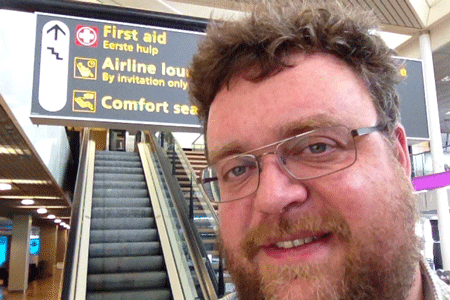Dean of Undergraduate Studies and Student Affairs Martin Vigild uses Twitter to debate education and university policy. He refers to the social medium as a ‘coffee club’.
It was the idea of supplying a social feed with stories and images from his work as Dean of Undergraduate Studies and Student Affairs that led Martin Vigild to tweet. Now, with the prospect of soon having 100 followers on Twitter, he can only be considered a serious tweeter.
“When I tweet, I do so solely on behalf of DTU,” explains Martin Vigild. When he tweets roughly once a week on the microblogging platform, it is in his capacity as Dean of Undergraduate Studies and Student Affairs—regardless of whether the message is about ambitious students, dedicated staff or possibly the first flower of spring sprouting forth on the sunny side of Building 101.
As dean, it is easier being a member of ‘the coffee club of the educational elite’ than it is as Martin Vigild, he explains—a club that includes Danish Minister for Higher Education and Science Sofie Carsten Nielsen—or ‘Carsten’, as Vigild calls her, Lykke Friis, Provost at the University of Copenhagen, Metropol President Stefan Hermann and ‘all their friends’—the educational high-fliers who are frequent Twitter users.
For the Dean it is all about influencing opinion—when he sends out signals, people pick them up. He therefore uses Twitter as a communication channel for the minister and colleagues at the other universities and educational institutions:
“Twitter is a new forum where we can meet and design education and university policy. I see it as a work platform,” he says.

Being digital requires the occasional ‘selfie’—here in Amsterdam’s airport.
Twiplomacy
Martin Vigild and the course managers with whom he is associated are not alone in discussing politics on this social medium. A survey carried out in summer 2013 showed that about 78 per cent of world leaders are on Twitter. The phenomenon is known as ‘Twiplomacy’.
“Twitter enables users to influence stakeholders directly—outside of the mass media, as numerous politicians were quick to discover,” says Finn Årup Nielsen, Senior Researcher at DTU Compute.
“It also allows you to share good everyday stories which a news editor would otherwise ignore.”
Vigild has proved himself to be a fast learner. He recently mastered the art of iPad tweeting, and a week after giving this interview, he will be holding a meeting with Lykke Friis to continue a discussion that began on Twitter—the first meeting he has arranged directly using hashtags and @ signs. The only thing puzzling him is why ‘LOL’ is not used more on this social medium.
It is probably because it belongs to a different lingo than the one used by the coffee club, he surmises.